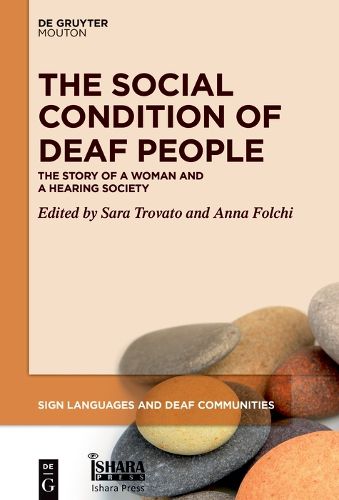Readings Newsletter
Become a Readings Member to make your shopping experience even easier.
Sign in or sign up for free!
You’re not far away from qualifying for FREE standard shipping within Australia
You’ve qualified for FREE standard shipping within Australia
The cart is loading…






This title is printed to order. This book may have been self-published. If so, we cannot guarantee the quality of the content. In the main most books will have gone through the editing process however some may not. We therefore suggest that you be aware of this before ordering this book. If in doubt check either the author or publisher’s details as we are unable to accept any returns unless they are faulty. Please contact us if you have any questions.
This book is about the social condition of Deaf people, told through a Deaf woman’s autobiography and a series of essays investigating how hearing societies relate to Deaf people. Michel Foucault described the powerful one as the beholder who is not seen. This is why a Deaf woman’s perspective is important: Minorities that we don’t even suspect we have power over observe us in turn. Majorities exert power over minorities by influencing the environment and institutions that simplify or hinder lives: language, mindsets, representations, norms, the use of professional power. Based on data collected by Eurostat, this volume provides the first discussion of statistics on the condition of Deaf people in a series of European countries, concerning education, labor, gender. This creates a new opportunity to discuss inequalities on the basis of data. The case studies in this volume reconstruct untold moments of great advancement in Deaf history, successful didactics supporting bilingualism, the reasons why Deaf empowerment for and by Deaf people does and does not succeed. A work of empowerment is effective if it acts on a double level: the community to be empowered and society at large, resulting in a transformation of society as a whole. This book provides instruments to work towards such a transformation.
$9.00 standard shipping within Australia
FREE standard shipping within Australia for orders over $100.00
Express & International shipping calculated at checkout
This title is printed to order. This book may have been self-published. If so, we cannot guarantee the quality of the content. In the main most books will have gone through the editing process however some may not. We therefore suggest that you be aware of this before ordering this book. If in doubt check either the author or publisher’s details as we are unable to accept any returns unless they are faulty. Please contact us if you have any questions.
This book is about the social condition of Deaf people, told through a Deaf woman’s autobiography and a series of essays investigating how hearing societies relate to Deaf people. Michel Foucault described the powerful one as the beholder who is not seen. This is why a Deaf woman’s perspective is important: Minorities that we don’t even suspect we have power over observe us in turn. Majorities exert power over minorities by influencing the environment and institutions that simplify or hinder lives: language, mindsets, representations, norms, the use of professional power. Based on data collected by Eurostat, this volume provides the first discussion of statistics on the condition of Deaf people in a series of European countries, concerning education, labor, gender. This creates a new opportunity to discuss inequalities on the basis of data. The case studies in this volume reconstruct untold moments of great advancement in Deaf history, successful didactics supporting bilingualism, the reasons why Deaf empowerment for and by Deaf people does and does not succeed. A work of empowerment is effective if it acts on a double level: the community to be empowered and society at large, resulting in a transformation of society as a whole. This book provides instruments to work towards such a transformation.